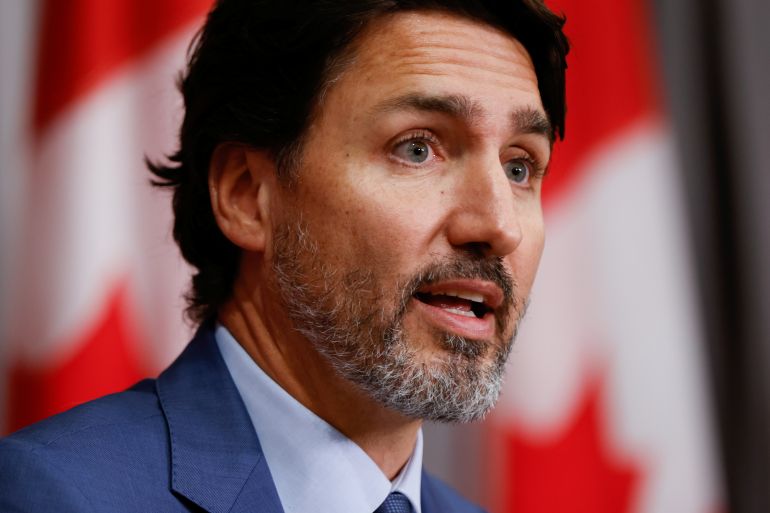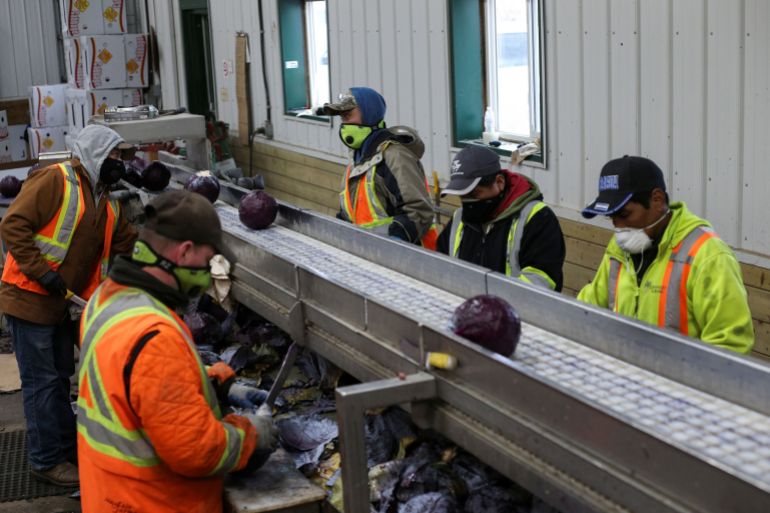Canada aims to bring in over 1.2 million immigrants over 3 years
Immigration Minister Marco Mendicino says plan seeks to fill workforce shortages and boost Canada’s economy.

Canada plans to bring in more than 1.2 million new immigrants over the next three years, the federal immigration minister said on Friday, as the country tries to fill gaps in its labour market and boost the economy, both hard hit by the COVID-19 pandemic.
Speaking to reporters in Ottawa, Immigration Minister Marco Mendicino said the federal government aims to accept 401,000 new permanent residents in 2021, another 411,000 in 2022 and then 421,000 in 2023.
Canada needs more workers, he said, “and immigration is the way to get there”.
“Before the pandemic, our government’s goal to drive the economy forward through immigration was ambitious. Now it’s simply vital,” said Mendicino, who tabled the new immigration targets earlier in the day.
Canadians understand that newcomers are playing an outsized role in stepping up to fill some of our most acute labour shortages and that growing our population is imperative if we want to leverage the advantages we have and keep 🇨🇦 competitive on the world stage. pic.twitter.com/YbHhyoONTL
— Marco Mendicino (@marcomendicino) October 30, 2020
Robert Falconer, a refugee and immigration policy researcher at the University of Calgary School of Public Policy, tweeted Friday that if the government meets its goals, the next three years will be “the highest years on record since 1911”.
In a notice outlining the details of its plan, Ottawa said it aims to welcome 232,500 newcomers from the economic class of immigrants in 2021, as well as 103,500 family members of people already in Canada, 59,500 refugees and other protected persons. Another 5,500 people will be accepted on humanitarian grounds.
Canada’s immigration system has long been held up as a model, as it has historically brought in skilled workers as well as refugees and individuals seeking to reunite with family members already in the country.
The country closed its borders to most immigrants in March due to COVID-19. Through August, it had settled 128,425 newcomers, Reuters news agency reported – less than half of the 341,000-person target it had set for 2020.
The COVID-19 pandemic also has put glaring inequalities and longstanding problems with Canada’s immigration system under increased scrutiny.

Many asylum seekers and refugees face poor working conditions, while several key industries in Canada, such as healthcare, food processing and farming, rely on workers whose precarious immigration status places them at risk of abuse.
A movement has grown over the past several months demanding Canada grant permanent immigration status for these front line workers, many of whom are labouring under conditions that place them at risk of contracting COVID-19.
‘Status for all’
Amid that pressure, the federal government announced plans earlier this year to regularise the status of a narrow segment of these workers – asylum seekers working in specific healthcare jobs – that politicians dubbed “guardian angels”.
Some estimates put the number of workers eligible for that pathway to residency at about 1,000 people, however – far lower than the total number of workers with non-permanent status in Canada.
“Immigrants are critical to our healthcare sector and represent one in four working in our hospitals and long-term care homes,” Mendicino said on Friday.
“Whether they’ve been taking care of our most vulnerable, or putting food on our tables, newcomers have played an outsized role in our response to COVID-19.”
Reacting to the announcement, the Migrant Workers Alliance for Change, an advocacy group, said the government should put in place “a single-tier immigration system” that ensures status for all migrants.
Raising immigration targets for a post-pandemic economic recovery means a single-tier immigration system that ensures #StatusforAll migrant & undocumented people is imperative. Add your voice to our call for a #JustRecovery – https://t.co/y9KjMbYsEf https://t.co/lt6UcpViDK
— Migrant Workers Alliance for Change (@MWACCanada) October 30, 2020
Hundreds of organisations across Canada have endorsed that demand and a national day of action is scheduled for November 1.
“All migrants, refugees and undocumented people in the country must be regularised and given full immigration status now without exception. All migrants arriving in the future must do so with full and permanent immigration status,” the groups say in an open letter.
Canada has been hard hit by COVID-19, reporting more than 232,000 cases and at least 10,000 deaths attributed to the virus since the pandemic began.
Earlier on Friday, the country’s top public health officer urged Canadians to reduce their contacts with others by at least 25 percent in order to stem the second wave of the pandemic.
“To bend the epidemic curve and reduce transmission to lover levels … we must really reduce our number of contacts as much as possible,” Dr Theresa Tam said, as reported by CBC News.